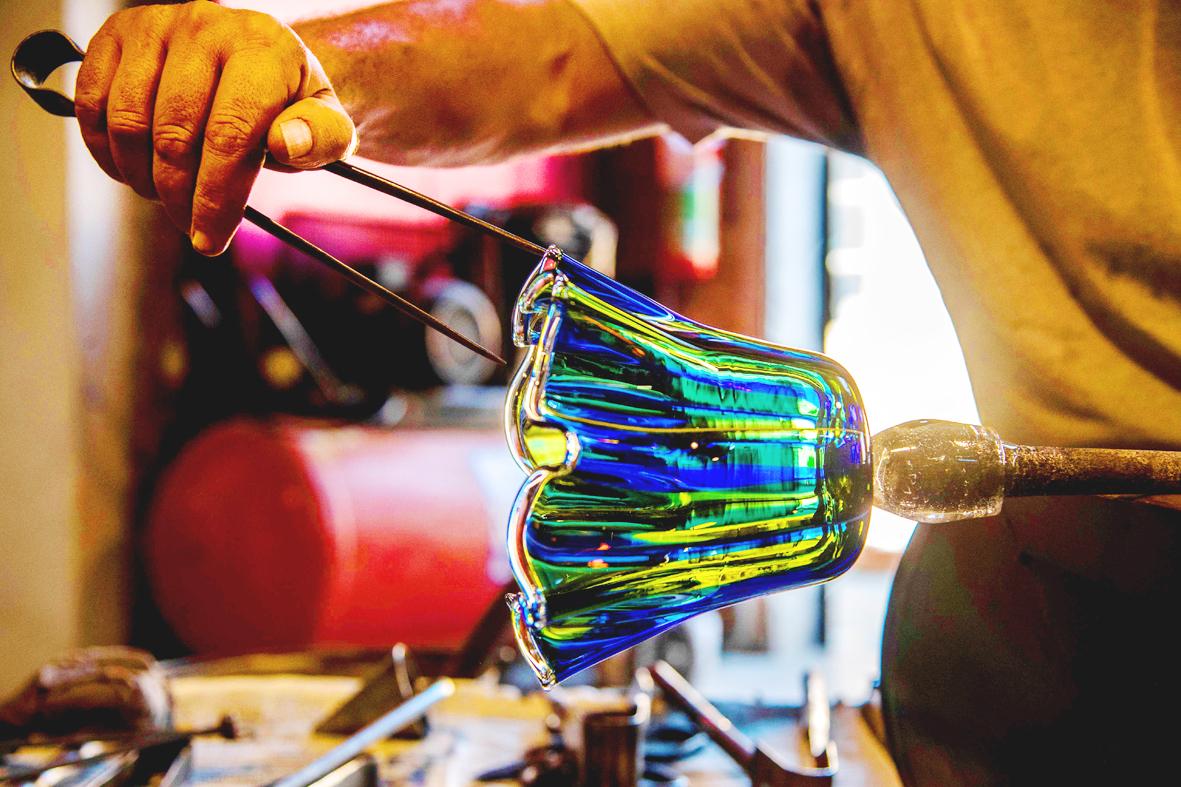Standing at a glowing furnace on a boat at the foot of the Rialto Bridge on Venice’s Grand Canal, Matteo Tagliapietra blows glass in a mesmerizing demonstration of centuries-old Murano glassmaking.
The world-famous brand might take pride of place in the souvenir shops that pepper the alleyways in the Italian lagoon city, but 70 percent of the glass objects sold are actually fake and not produced in Venice, said Luciano Gambaro, head of an association that promotes Murano glassware.
So for the fourth consecutive year, authorities have organized “Venice Glass Week,” a series of events to raise awareness of “real” Murano glass, one of Italy’s most famous exports.

Photo: AFP
A history that began in 1291 when La Serenissima, as the Venetian sovereign state was then known, ordered all glassmakers working in the old town to move to the island of Murano on the lagoon, as they had caused too many fires in the center.
Coinciding with the Venice International Film Festival, glass week is a way to “shine the spotlight on what Murano represents,” said Gambaro, as he showed off his family enterprise on the island.
At the heart of his treasure trove lies the furnace room where Tagliapietra, his associate, reigns king.

Photo: AFP
Sporting black shorts and white socks, Tagliapietra uses his blow pipe to shape a vase with meticulous movements.
“The methods have been the same for centuries. At the time of La Serenissima, glassmakers were superstars,” he said with a smile as he modeled his artwork. “Now, we do less and less mass production in favor of custom orders.”
“That way, we’re returning to the origins of Murano glassware, using all our potential for creativity. Murano must continue to evolve, change and adapt, that is the future,” Gambaro said. “Whoever just does what he has done all his life has no future.”
That thought has also spurred the glassmakers of Murano to leave their island to meet their customers and publicize their work.
Among the initiatives launched by the glassmaking sector is an exhibition near the famed Gallerie dell’Accademia museum, showing off works made by artists who are under 35, and each evening, a 14m-long boat that carries a furnace gives demonstrations of glassmaking in emblematic parts of the city.
To fight against counterfeits, many of which are imported from Asia, the region of Veneto created the registered trademark of “Vetro Artistico Murano” in 1994.
It certifies that products sporting the logo with an identification code are made on the island, but the dramatic fall in tourists caused by flooding in November last year and then the COVID-19 pandemic has hit local trade badly.
“Our sector is undoubtedly suffering, especially those who live exclusively off the local market, they’re in a bad situation, but the international market is starting to get going again,” Gambaro said.
Far from the imported glassware that fetches a couple of euros, some Murano glassware can cost tens of thousands.
“Our works are present from Versailles to Saint Petersburg via Madrid,” Gambaro said. “Our history spans more than eight centuries and has never stopped, even if we have already experienced crises.”

Semiconductor shares in China surged yesterday after Reuters reported the US had ordered chipmaking giant Taiwan Semiconductor Manufacturing Co (TSMC, 台積電) to halt shipments of advanced chips to Chinese customers, which investors believe could accelerate Beijing’s self-reliance efforts. TSMC yesterday started to suspend shipments of certain sophisticated chips to some Chinese clients after receiving a letter from the US Department of Commerce imposing export restrictions on those products, Reuters reported on Sunday, citing an unnamed source. The US imposed export restrictions on TSMC’s 7-nanometer or more advanced designs, Reuters reported. Investors figured that would encourage authorities to support China’s industry and bought shares

TECH WAR CONTINUES: The suspension of TSMC AI chips and GPUs would be a heavy blow to China’s chip designers and would affect its competitive edge Taiwan Semiconductor Manufacturing Co (TSMC, 台積電), the world’s biggest contract chipmaker, is reportedly to halt supply of artificial intelligence (AI) chips and graphics processing units (GPUs) made on 7-nanometer or more advanced process technologies from next week in order to comply with US Department of Commerce rules. TSMC has sent e-mails to its Chinese AI customers, informing them about the suspension starting on Monday, Chinese online news outlet Ijiwei.com (愛集微) reported yesterday. The US Department of Commerce has not formally unveiled further semiconductor measures against China yet. “TSMC does not comment on market rumors. TSMC is a law-abiding company and we are

FLEXIBLE: Taiwan can develop its own ground station equipment, and has highly competitive manufacturers and suppliers with diversified production, the MOEA said The Ministry of Economic Affairs (MOEA) yesterday disputed reports that suppliers to US-based Space Exploration Technologies Corp (SpaceX) had been asked to move production out of Taiwan. Reuters had reported on Tuesday last week that Elon Musk-owned SpaceX had asked their manufacturers to produce outside of Taiwan given geopolitical risks and that at least one Taiwanese supplier had been pushed to relocate production to Vietnam. SpaceX’s requests place a renewed focus on the contentious relationship Musk has had with Taiwan, especially after he said last year that Taiwan is an “integral part” of China, sparking sharp criticism from Taiwanese authorities. The ministry said

US President Joe Biden’s administration is racing to complete CHIPS and Science Act agreements with companies such as Intel Corp and Samsung Electronics Co, aiming to shore up one of its signature initiatives before US president-elect Donald Trump enters the White House. The US Department of Commerce has allocated more than 90 percent of the US$39 billion in grants under the act, a landmark law enacted in 2022 designed to rebuild the domestic chip industry. However, the agency has only announced one binding agreement so far. The next two months would prove critical for more than 20 companies still in the process